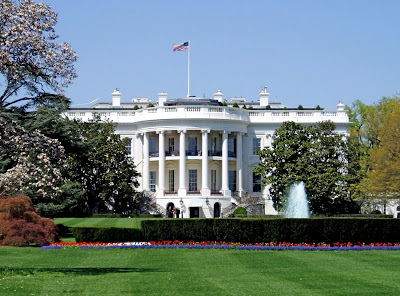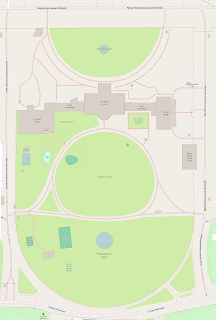 Located at
1600 Pennsylvania Avenue NW in Washington, D.C., the White House is the
official residence and workplace of the President of the United States of
America. The construction began in 1792 and the place has been the residence of
every U. S. president since John Adams, the second one.
Located at
1600 Pennsylvania Avenue NW in Washington, D.C., the White House is the
official residence and workplace of the President of the United States of
America. The construction began in 1792 and the place has been the residence of
every U. S. president since John Adams, the second one.
The building has classical inspiration sources, that could be found
directly or indirectly in the Roman architect Vitruvius or in Andrea Palladio styles;
Palladio being an Italian architect of the Renaissance which had a considerable
influence on the Western architecture (Palladian architecture).
The
residence was designed by Irish-born architect James Hoban in the neoclassical style.
Construction took place between 1792 and 1800 using Aquia Creek sandstone painted
white. When Thomas Jefferson moved into the house in 1801, he (with architect Benjamin
Henry Latrobe) added low colonnades on each wing that concealed stables and storage.
In 1814, during the War of 1812, the mansion was set ablaze by the British Army
in the Burning of Washington, destroying the interior and charring much of the exterior.
Reconstruction began almost immediately, and President James Monroe moved into the
partially reconstructed Executive Residence in October 1817. Exterior construction
continued with the addition of the semi-circular South portico in 1824 and the North
portico in 1829.
 Because of crowding
within the executive mansion itself, President Theodore Roosevelt had all work offices
relocated to the newly constructed West Wing in 1901. Eight years later in 1909,
President William Howard Taft expanded the West Wing and created the first Oval
Office, which was eventually moved as the section was expanded. In the main mansion,
the third-floor attic was converted to living quarters in 1927 by augmenting the
existing hip roof with long shed dormers. A newly constructed East Wing was used
as a reception area for social events; Jefferson's colonnades connected the new
wings. East Wing alterations were completed in 1946, creating additional office
space. By 1948, the house's load-bearing exterior walls and internal wood beams
were found to be close to failure. Under Harry S. Truman, the interior rooms were
completely dismantled and a new internal load-bearing steel frame constructed inside
the walls. Once this work was completed, the interior rooms were rebuilt.
Because of crowding
within the executive mansion itself, President Theodore Roosevelt had all work offices
relocated to the newly constructed West Wing in 1901. Eight years later in 1909,
President William Howard Taft expanded the West Wing and created the first Oval
Office, which was eventually moved as the section was expanded. In the main mansion,
the third-floor attic was converted to living quarters in 1927 by augmenting the
existing hip roof with long shed dormers. A newly constructed East Wing was used
as a reception area for social events; Jefferson's colonnades connected the new
wings. East Wing alterations were completed in 1946, creating additional office
space. By 1948, the house's load-bearing exterior walls and internal wood beams
were found to be close to failure. Under Harry S. Truman, the interior rooms were
completely dismantled and a new internal load-bearing steel frame constructed inside
the walls. Once this work was completed, the interior rooms were rebuilt.
The modern-day
White House complex includes the Executive Residence, West Wing, East Wing, the
Eisenhower Executive Office Building—the former State Department, which now houses
offices for the President's staff and the Vice President—and Blair House, a guest
residence. The Executive Residence is made up of six stories—the Ground Floor, State
Floor, Second Floor, and Third Floor, as well as a two-story basement. The property
is a National Heritage Site owned by the National Park Service and is part of the
President's Park. In 2007, it was ranked second on the American Institute of Architects
list of "America's Favorite Architecture".



No comments:
Post a Comment